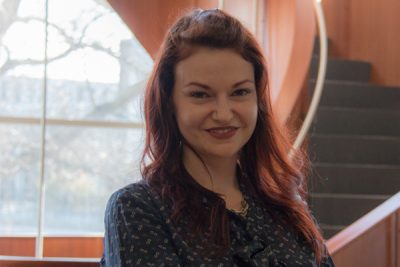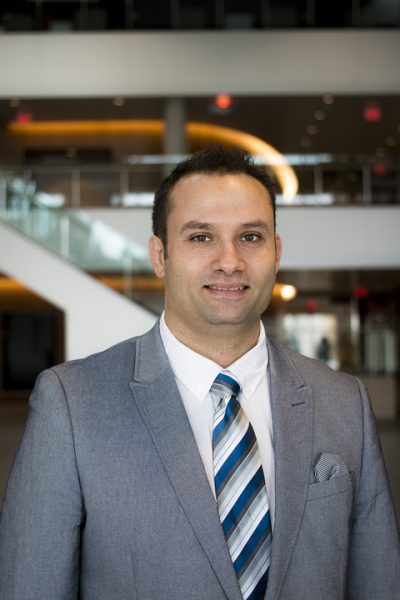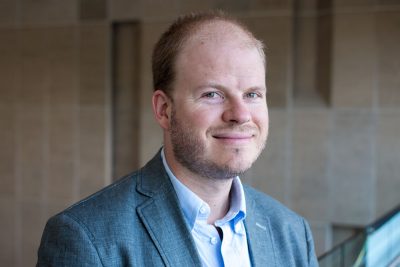From the impact of racial bias on Canadian jurors to the causes of the Ukraine crisis, research in the Faculty of Public Affairs is receiving strong support from the Social Sciences and Humanities Research Council (SSHRC) this year.
Four research projects led by FPA faculty members have been granted SSHRC Insight Grants worth more than $466,000. Three other researchers were co-applicants on winning bids. An additional group won a SSHRC Partnership Development Grant.
“These prestigious awards are a recognition of the hard work and diligence shown by our researchers in the Faculty of Public Affairs,” says André Plourde, the Dean of the Faculty of Public Affairs. “Their efforts will have a positive educational impact on their colleagues and students as well as a positive impact on society.”
The Faculty’s success with the Social Sciences and Humanities Research Council awards reflects the strong emphasis FPA places on high-quality research that aims to address regional and global challenges.
The 2016 Insight Grant Award Winners
Joan DeBardeleben, Institute of European, Russian and Eurasian Studies

“The European Union’s Eastern Policy and the Ukraine Crisis: Causes and Impacts”
When the European Union was enlarged in 2004, its mission was to promote peace and prosperity through interdependence among neighbours. But the Ukraine crisis of 2014 challenged this perception.
“Russia’s strong reaction to events in Kiev took most analysts by surprise,” says Professor DeBardeleben, a Professor in the Institute of European, Russian and Eurasian Studies and the Director of the Centre for European Studies. “It was seen in the West as a disturbing violation of international law and of Ukraine’s sovereignty.”
Professor DeBardeleben was awarded $114,000 for research that will examine the underlying causes of this unexpected development, which contradicted the EU’s initial policy goals. She will also study how EU leaders overlooked the geopolitical implications of their actions and how they are now reframing their policies based on this experience. She is currently on sabbatical in Germany, conducting interviews with public officials and experts, analyzing policy debates, legislation, policy statements, and media reports.
“We often look at things exclusively from the perspective of one side, but we need to understand the motivations behind the actions of other countries, as well.”
Randall Germain, Department of Political Science

“The Idea of Historical Reasoning in International Political Economy”
When political economists study the relationship between governments and the markets, they tend to look at things like the influence of the Chinese currency on global markets, the U.S. trade deficit, or the future of Canadian banks.
According to Randall Germain, a Professor in the Department of Political Science and the Institute for Political Economy, his colleagues in political economy too often fail to consider the historical underpinnings of their research questions.
“Researchers in this field use many different theories to inform their work, so they rarely stop to ask about the intellectual roots of our discipline, what unites us,” argues Professor Germain. “So I’m hoping to correct that imbalance by rehabilitating an important feature of the history of our field.”
Professor Germain’s SSHRC Insight Grant, worth $97,000, will allow him to reframe the history of the field of International Political Economy, highlighting influential thinkers such as Dr. Robert Cox, who was his own mentor at in the political science department at York University.
“Today, many researchers are informed by the distinctive picture of global political economy that Cox put forth, but his own intellectual influences are not well known,” said Germain, whose project is entitled “The Idea of Historical Reasoning in International Political Economy”. “This project will provide a new conceptual basis for thinking about our field.”
Evelyn Maeder, Institute of Criminology and Criminal Justice

“Race and the Canadian Jury: Investigating Regional Differences and the Effects of Jury Racial Composition”
The influence of race and racial bias on the outcomes of criminal trials has been long-established in the United States. Here in Canada, Professor Evelyn Maeder has found that prospective jurors are not immune to such bias. But unlike in the United States, the effect in Canada is found mostly for Aboriginal defendants.
“Though the findings are mixed, overall there is a small but significant effect of defendant race on juror decision-making, such that minority defendants are more likely to be found guilty.”
Professor Maeder studies these effects of “extralegal” information—defendant race, victim attractiveness, among others—on juror decision-making in Canada, using experimental stimulations at Carleton’s Institute of Criminology and Criminal Justice. Her research was awarded $164,000 from SSHRC.
“We ask participants to read a transcript or watch a video of a trial and then deliberate as a jury within the lab,” she explains. “We want to see how this is dealt with in a group discussion.”
In her SSHRC-funded research, Professor Maeder will approach the subject from two angles: whether the racial composition of the jury has an effect and whether regional differences influence a jury’s bias.
“There are competing explanations for why bias may differ as a result of a region’s racial composition,” explains Professor Maeder. “Does increased contact with minority individuals improve relationships, or does increased contact feel threatening to the majority?”
Professor Maeder will stage the mock jury deliberations in the Department’s new Legal Decision Making Laboratory with participants from the community.
Dale Spencer, Department of Law and Legal Studies (co-applicant)

“A Genealogical Study of Indigenous Adoption in Canada: A Multi-faceted Examination of Events in the Removal of Indigenous Children with a Concentration on Child Welfare Policy Shifts between 1950 and 1985”
It’s fair to say that most Canadians have never heard of “the Sixties Scoop”, a period of intense Indigenous child welfare apprehensions, which continued as late as 1985. This widespread removal of Indigenous children from their homes is the focus of research being conducted by Assistant Professor Dale Spencer in the Department of Law and Legal Studies and four other co-applicants, under Principal Investigator Raven Sinclair of the University of Regina.
The group, which was granted $313,480 by SSHRC, describe the Sixties Scoop as a “part of successive government policies of assimilation”, which began with the residential school system.
“It is an important period to examine because there is incomplete information in the literature about how this program came to be, and more specifically, (there are) no examinations of the policy shifts that created the conditions of possibility for mass apprehensions of Indigenous children,” said the researchers in their application.
Professor Spencer says the group will look for any legal or policy basis at the provincial and national level for forcibly removing children from their families. They will also conduct archival work and interview social workers who were in the field during that time period. Professor Spencer’s contribution will also include interviews with adoptees, many of whom attend Indigenous adoptee gatherings across Canada.
“This was an attempted cultural genocide on the Indigenous people of Canada that was and remains not well-known outside of the Indigenous community,” says Professor Spencer. “It was more obscure and difficult to recognize as a colonizing practice because the language of saving children from ostensibly abusive or neglectful parenting sanitized the explicit assimilationist rhetoric.”
Matthew Webb, Department of Economics

“Improving Cluster Robust Inference”
Crucial decisions are often based on evidence from statistical analysis. And sometimes, that analysis is wrong.
For instance, Matthew Webb, an Assistant Professor in the Department of Economics, points to the early empirical research on the employment effects of increasing the minimum wage.
“The analysis seemed to predict that increasing the minimum wage would lead to an increase in employment,” says Professor Webb. “However, after dealing with statistical issues it was found that the minimum wage increase likely had no effect on employment.”
The problem lies in complications that economists themselves only recognized within the past 20 years: that the statement of statistical significance—how likely a result is to occur by chance alone — was calculated incorrectly.
“The conventional toolkit will give you a lot of false positives, which show an impact that isn’t there,” says Professor Webb. “Those statistical issues lead people down the wrong path.”
As part of a four-year $90,000 SSHRC Insight Grant, Professor Webb will improve procedures for reducing the frequency of these errors in calculating statistical significance. He will also develop non-technical user’s guides to aid policymakers who often make decisions based on statistical analysis. This research has the potential to contribute significant improvements to the rigour of quantative methodologies across the social sciences.
He acknowledges that the research seems to be focused on the “footnotes” of a report, but when it comes to public policy, Professor Webb warns that the consequences of improper statistical analysis can be “quite costly”.
Congratulations to our Insight Development Grant winners!
We will be featuring them in a future story on the FPA website.
Friday, September 9, 2016 in Department of Economics, Department of Law and Legal Studies, Department of Political Science, Groundbreaking Research, Institute of Criminology and Criminal Justice, Institute of European, Russian, and Eurasian Studies, News
Share: Twitter, Facebook



